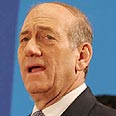
PM: Israel not ruling out European force in Lebanon
Olmert tells German foreign minister he would consider permitting deployment of experienced European military force in Lebanon, adding that such a force would have to assist Lebanese government in implementing UN Resolution 1559, which calls for Hizbullah’s disarmament
The prime minister added that such a force would have to control passages between Syria and Lebanon, deploy along the Lebanese-Israel border and assist the Lebanese army, especially in case it implements UN Resolution 1559 and works to disarm Hizbullah.
Israel is not ruling out the possibility that Lebanon, headed by Prime Minister Fouad Siniora, will serve as a mediator in negotiations with Hizbullah. Officials in Jerusalem are looking into this possibility to enhance talks on the release of kidnapped soldiers Ehud Goldwasser and Eldad Regev.
Sources in the Prime Minister's Office didn't pin their hopes on a possible Lebanese channel. "We heard comments by the Lebanese parliament speaker, were heard their foreign minister who reported that the kidnapped are well. But a political process is far away. If there is a process it is not ripe yet. These are Lebanese declarations. We didn't hear that Hizbullah is responsible for these things," they said.
Livni: Crisis is test for international community
Speaking to reporters, Foreign Minister Tzipi Livni spoke of the diplomatic efforts: "Today the French and German foreign ministers and the British minister for Middle East affairs visited and the Congress Intelligence Committee was here and a support group from Europe was here. Tomorrow Condoleezza Rice is here, and next week the Finnish foreign minister, the European Union's Foreign Affairs Commissioner, and the deputy Russian foreign minister are expected to visit and therefore we will have a week of dynamic diplomacy."
Livni said that the military operation and the diplomatic process do not contradict one another: "It is important to say – since I hear discussion about whether it is time for diplomacy – that there is no tension between the two processes, the political and the military, and it is worth it to change some of the terms from the past or process we were used to from the past. In the past they used to see the diplomatic process as gaining time for the army. Or alternatively a kind of negotiations between two sides at the end of which there a ceasefire and that's it. I see things differently, and therefore I though it is good to start these processes while the military operation is being carried out."
The foreign minister said that "in the day after, my job is to make sure that this territory is clean for a long time. I see it my responsibility to make sure that Hizbullah will not be armed again in the past. Talks aim at preserving the achievements of the army."
She added that Israel wants to see a strong government in Lebanon. "When a terror organization is working beside the government, the situation is intolerable. Claims by the Lebanese government that it cannot implement resolution 1559 are weak because it is unable to impose its sovereignty. And therefore we not only facing a test for Lebanon and Israel but a test for the international community."










